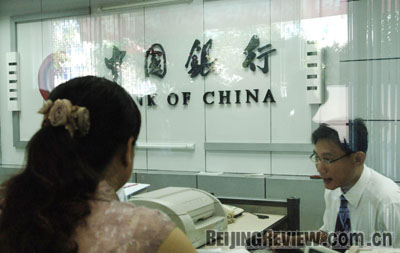| 
ROAD TO RICHES: China's state-owned banks have increased their market
values thanks to their booming domestic businesses
While Chinese athletes were busy winning competitions at the Beijing Olympics, the country's state-owned banks were enjoying their own gold-medal performances in the global financial sector.
According to Bloomberg, Chinese banks are in three of the top seven positions among the world's largest financial companies in terms of market value. The Industrial and Commercial Bank of China Ltd. (ICBC), China Construction Bank Corp. (CCB) and the Bank of China Ltd. ranked number one, two and seven, respectively. Only two years ago the list was still dominated by Citigroup Inc. and Bank of America Corp. of the United States, and UBS AG of Europe.
Analysts say the Western giants, mired in financial straits, have been falling down the ranks because massive write-downs and loan losses have caused their share prices to plummet. London-based HSBC Group, the largest non-Chinese bank, which reported the largest profits of any bank last year, recently said its first-half net profit fell 29 percent to $7.72 billion from the same period in 2007.
By sharp contrast, the Chinese banks have fared much better and remained largely immune to the global financial downturn. ICBC said in its interim report that its net profit jumped 56.75 percent to 64.9 billion yuan ($9.5 billion) in the first half of the year in line with forecasts. Widening interest margins and growth in the bank's fee income pushed up profits, the company said. Jiang Jianqing, Chairman of ICBC, said at a recent press conference that the bank had a strong performance because China's vibrant economy boosted the overall banking sector. CCB also saw its first-half net profit grow by a whopping 71.34 percent to more than 58 billion yuan ($8.5billion).
China's banking upswing started earlier this decade when the government began restructuring drives to bailout low-quality state-owned banks. The government pumped in huge amounts of money to lower their bad loan ratios and invited foreign strategic investors. The banks then went public on Hong Kong's H-share market and the domestic A-share market. The creation of modern commercial banks in China is expected to breathe new life into the development of the country's banking system.
Analysts say the Chinese banks also have benefited from government controls on interest rates that guarantee income through large spreads between deposits and lending rates. For example, ICBC's first-half net interest income rose 28.9 percent to 131.8 billion yuan ($19.3 billion), which accounted for about 50 percent of its total revenue. Its net interest margin was 3.01 percent in the first half, compared with 2.8 percent in 2007.
Besides this, another reform this year, in which the government decreased the corporate tax rate to 25 percent from 33 percent, also bolstered bank profits.
Analysts say the Chinese banks could remain unscathed by the subprime shockwaves largely because they have had little exposure to overseas markets relative to their sizes and their lack of sophisticated credit instruments. ICBC, for instance, has a market capitalization of $235 billion, but has limited its exposure to the subprime crisis. It said it held bonds related to Fannie Mae and Freddie Mac, the ailing U.S. housing mortgage agencies, totaling $2.7 billion, or equivalent to only 0.2 percent of its total assets.
| 